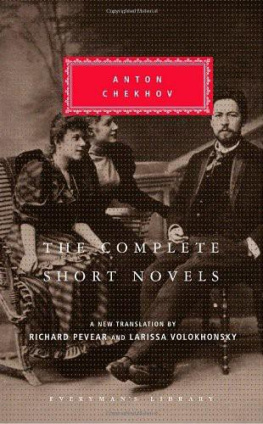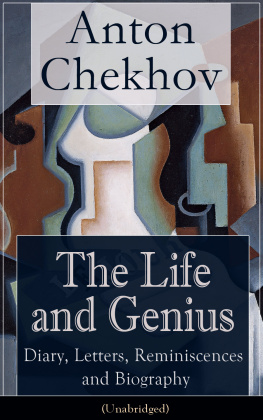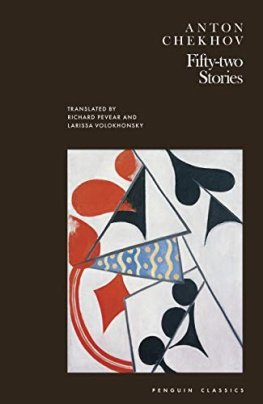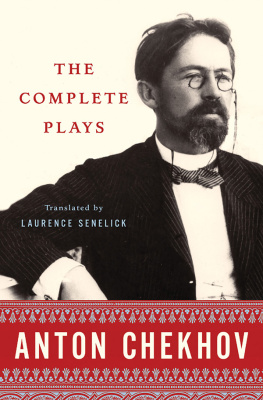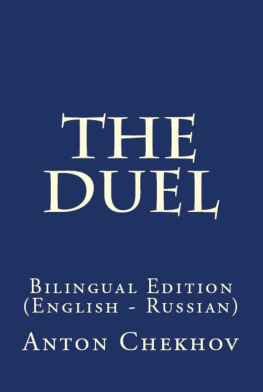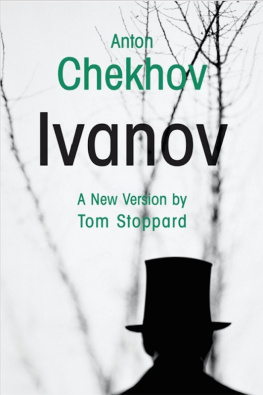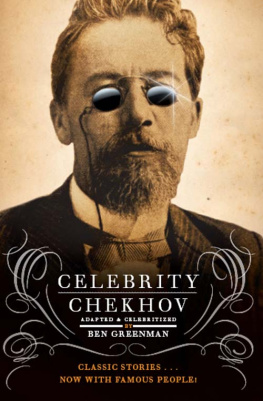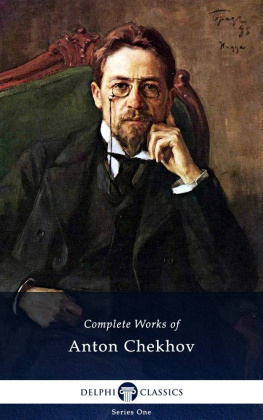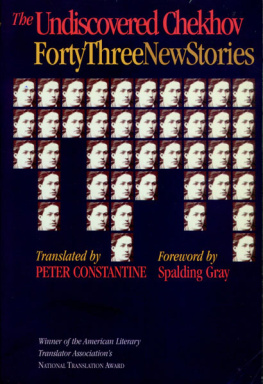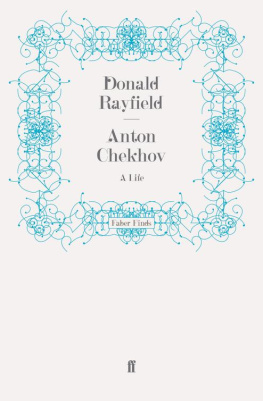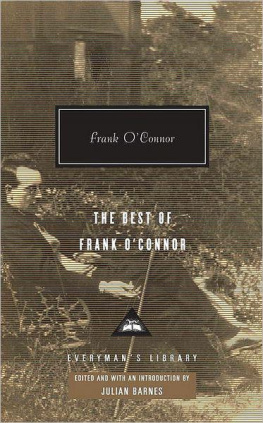Table of Contents
THE COMPLETE SHORT
NOVELS
ANTON CHEKHOV
Translated from the Russian by
RICHARD PEVEAR and LARISSA VOLOKHONSKY
With an introduction by RICHARD PEVEAR
Copyright2004
ISBN: 140003292X
Introduction
God's world is good. One thing is not good: us.
Chekhov to Suvorin, 1891
A good man's indifference is as good as any religion.
Chekhov's diary, 1897
Chekhov wrote his first and only novel when he was twenty-four. Its title is Dramana okhote, or Drama at the Hunt, known in English as A Shooting Party. It is 170 pages long, was serialized in thirty-two issues of the scandal sheet Daily News (which Chekhov renamed Daily Spews) from August 1884 to April 1885, and was never reprinted in his lifetime. It is by far his longest work of fiction. As Donald Rayfield wrote in Chekhov: The Evolution of His Art, "It reflects almost everything he had ever read, from The Sorrows of Young Werther to The Old Age of Lecoq. It also contains embryonically everything he was to write." It is part detective story, part psychological study, and very cleverly plotted a broad parody with a fine sense of the absurd, filled with stock Russian characters and situations, set on a decaying estate that would reappear time and again in Chekhov's subsequent work. One of the characters is a nave and sympathetic doctor, not unlike Dr. Samoilenko in The Duel and some of the other doctors who inhabit Dr. Chekhov's fictional world.
Drama at the Hunt gave fullest expression to Chekhov's early humorous manner, which was otherwise mainly confined to the brief sketches he produced to pay his way through medical school. The five works collected here belong to the period following his entry into serious literature. The first of them, The Steppe, published in 1888, the same year in which he won half of the Russian Academy's prestigious Pushkin Prize, was in fact the work which marked that entry. Through the mid-1890s, before the period of the last great plays, the idea of writing a novel continued to entice him. In February 1894 he took a sizeable advance from the Petersburg publisher Adolf Marx ("I've become a Marxist," he would joke later) for a novel to be serialized in the magazine Niva ("The Cornfield"). Meanwhile, he was working on what he described to his brother Mikhail as "a novel about Moscow life." This was Three Years, a story set in Moscow merchant circles, which he had been mulling over since 1891. It was published early in 1895 in the liberal journal Russian Thought. In the spring of 1896, to fulfill his contract with Marx, he set to work on another "novel," eventually entitled My Life, his last extended prose work and, in the opinion of D. S. Mirsky, his masterpiece.
Chekhov's genius defined its formal limits in these works of 90 to 120 pages. It balked at anything longer. Literary genres are notoriously elusive of definition (Chekhov called his last play, The Cherry Orchard, a comedy; its first director, Konstantin Stanislavsky, considered it a tragedy), but it seems justifiable to call the five works collected here short novels, and to distinguish them from Chekhov's other works, which are at most half their length. The question is metrical, not mechanical. A hundred-page narrative, whatever generic name we give it, moves to a different measure than a narrative of five, or fifteen, or even fifty pages. It includes the effective time and space of a full-bodied novel, but treats them with the short story's economy Introduction
of means. The interest in bringing Chekhov's five short novels together in one volume is precisely to focus on that distinction of form.
The Steppe was a pivotal work in Chekhov's artistic development. It opened the door to "serious literature" for him, but it also closed the door on the world of his childhood in southern Russia, in the area around Taganrog on the Sea of Azov, with its unique landscape, wildlife, and culture. He never wrote anything like it again. The prose is lyrical, musically constructed, full of alliterations and internal rhymes, its sentences shaped after what they describe, rendering the movement of the carriage, the mysteriously alive nights and immobile, stifling noondays of the steppe, the flashing and rumbling of what is one of the most famous thunderstorms in Russian literature. While he was working on it, he wrote to a friend that Gogol, "the tsar of the steppe," might be envious. Indeed, Gogol's influence is more marked in The Steppe than in anything else Chekhov wrote. Gogol's Dead Souls begins with the description of a rather handsome spring britzka driving into the district town of N. The Steppe begins with a shabby, springless britzka rolling out of another district town of N. The nod to the master is unmistakable. Like Dead Souls, The Steppe is virtually plotless, recounting a string of adventures that have no internal connection, a series of encounters with characters who are then left behind. Also like its predecessor, it combines an abundance of natural description with a sense of human flimsiness.
Chekhov allows himself the devices of Romantic prose that Gogol reveled in: apostrophes, anthropomorphisms, addresses to the reader. But the similarities end there, because the hero of The Steppe is not that middling, middle-aged apotheosis of banality, Chichikov, but a nine-year-old boy, whose innocent eye takes in the wonders and terrors of his thousand-mile journey with fear and curiosity.
Chekhov never ventured into anything like Gogol's cosmic satire, wild humor, or formal inventiveness. Gogol once boasted of Dead Souls: "All Russia will appear in it,"
but later confessed that he had made it all up. The writer who did know and portray
"all Russia" was Nikolai Leskov, a slightly younger contemporary of Dostoevsky, Turgenev, and Tolstoy. Leskov had traveled throughout Russia as an agent for the stewards of a rich Russian landowner, sending back reports that delighted his employers and marked his beginnings as a writer. Chekhov never met Dostoevsky or Turgenev; he was invited to Tolstoy's estate only in 1895, when he was already an established writer; but he ran into Leskov at a decisive moment, in the summer of 1883, when he was twenty-three and Leskov fifty-two. After some low-life carousing in Moscow, he and Leskov ended up in a cab together, where, as Chekhov recounted in a letter to his brother, the following exchange took place: "[Leskov] turns to me half drunk and asks: 'Do you know what I am?' 'I do.' 'No, you don't. I'm a mystic.' 'I know.'
He stares at me with his old man's popping eyes and prophesies: 'You will die before your brother.' 'Perhaps.' 'I shall anoint you with oil as Samuel did David... Write.
The consecration was more meaningful than the circumstances might suggest.
Chekhov was indeed Leskov's successor in important ways, not least in his knowledge of Russia. The critic Boris Eichenbaum wrote: "One of the basic principles of Chekhov's artistic work is the endeavor to embrace all of Russian life in its various manifestations, and not to describe selected spheres, as was customary before him."
Dostoevsky was an urban intellectual in excelsis, Turgenev and Tolstoy belonged to the landed gentry, but Chekhov was the son of a former serf, and not only saw things differently but also saw different things than his aristocratic elders. In its breadth of The Complete Short Novels
experience and closeness to life, in its linguistic resources -particularly the use of Church Slavonicisms and the rendering of peasant speech - Chekhov's work continues Leskov's. Chekhov also has a paradoxical, Leskovian vision of the harshness and beauty of the world that goes beyond correct moral or ideological attitudes, and he has something of Leskov's deep comic sense. Leskov was an Orthodox Christian, though of a somewhat unorthodox kind, for whom the evil and sin of the world could suddenly be pierced by holiness, and the "desperate injustice of earthly happening" (the words are Erich Auerbach's, in

